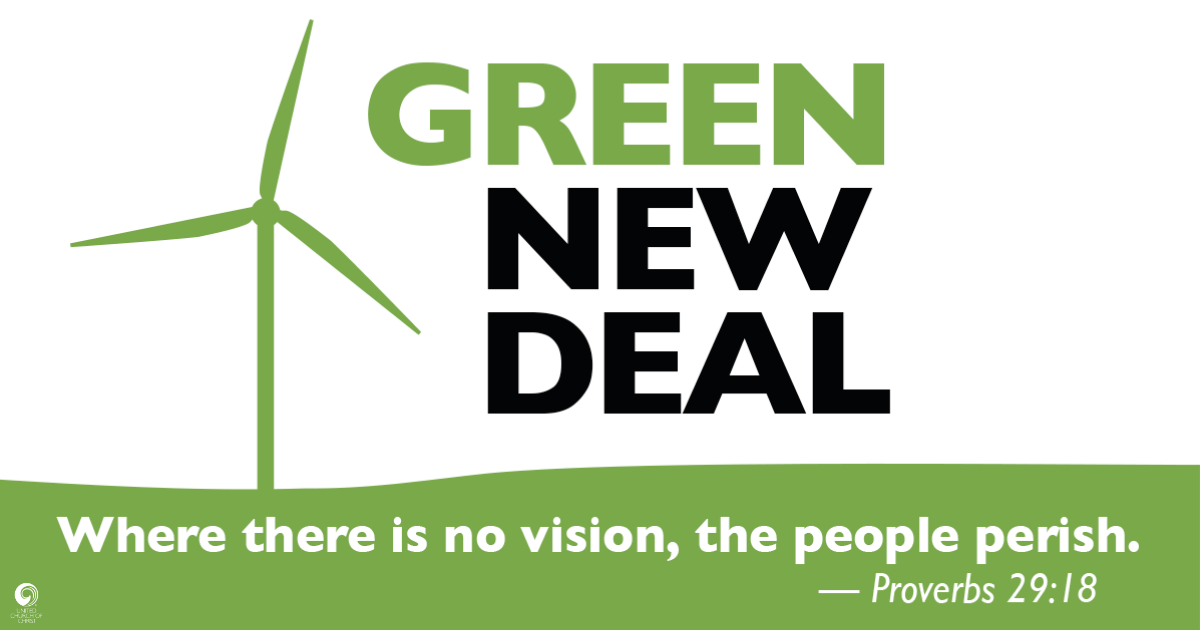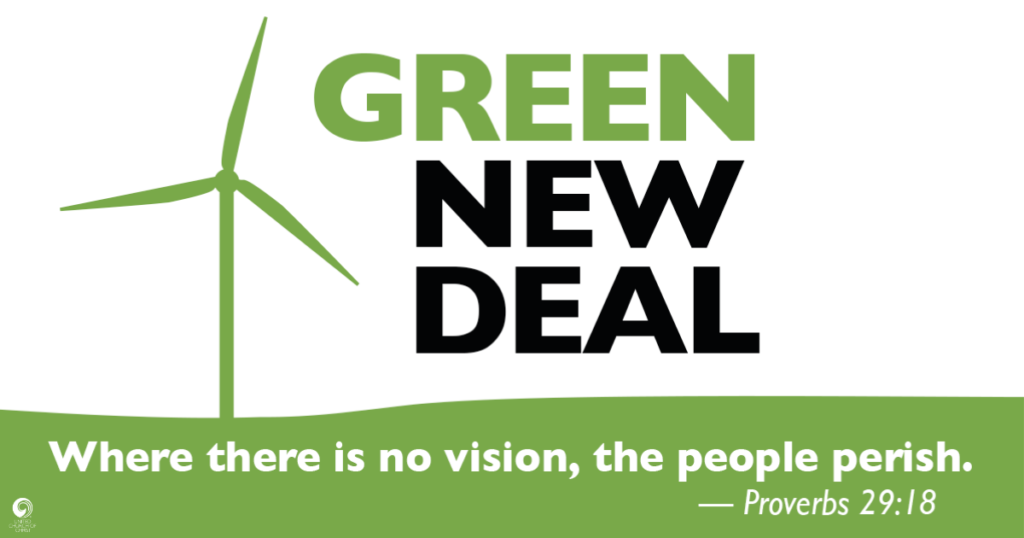Preaching on the Green New Deal

Seven preachers known for their work in caring for Creation were each asked to offer a tip on how to talk about the Green New Deal from the pulpit.
Tip # 1: Amid Crisis, Find Purpose and Vision in a Truth-Telling Space
The fulfillment of our covenant and the continuity of life on Earth depend upon pastors repurposing the church for current crisis. For climate change preaching to be effective, pastors need to do all they can to make their congregation a safe enough place to face the full truths of our long emergency. Amid such dire times, the Green New Deal becomes a matter of utmost significance. Preaching on the GND requires that the preacher believe that another world is possible! As Brueggemann reminds us, the preacher must “keep alive the ministry of the imagination, to keep on conjuring and proposing futures alternative to the single one the king wants to urge as the only thinkable one.” That’s exactly what the GND offers!
—Rev. Dr. Jim Antal, author of Climate Church, Climate World
Tip # 2: Connect to the Green New Deal by Connecting with Core Christian Values
Unless we change course fast, we won’t be able to leave our children and our children’s children a habitable world. We need to transform our society and economy at a rate and scope that are historically unprecedented. The Green New Deal is the first resolution to address the climate crisis with the urgency, focus, and comprehensiveness that the situation requires. The Green New Deal is not a piece of legislation or a detailed policy: it is a statement of intention to commit to stabilizing the climate while also creating economic security for all people in the U.S., including low-income communities and communities of color. To preach on the Green New Deal necessarily entails connecting with our cherished Christian values in our commitment to hear both the cry of the Earth and the cry of the poor.
—Rev. Dr. Margaret Bullitt-Jonas, Missioner for Creation Care Episcopal Diocese of Western Mass. and Massachusetts Conference, UCC, follow her at RevivingCreation.org
Tip # 3: Balance Truth-Telling with Hope-Giving
Those of us who preach must find a dynamic balance between truth-telling and hope-engendering. We cannot sing “For the Beauty of the Earth,” without also offering prayers of lament over the destruction of nature or baptize a bright-eyed baby without naming our responsibility to make that child’s future more livable. Preaching must be honest about the challenges we face, while also casting a vision of how God’s people have responded to challenge both historically and contemporarily in the name of love and justice. We cannot simply ignore environmental crises or seek to soothe with simplistic optimism. Instead, the preacher is called to proclaim a deep-rooted hope that will inspire and sustain tangible work for earth justice. In these times when hearts and spirits can become brittle with worry and fear, it is faith communities that offer a powerful alternative as we find fresh ways to articulate God’s dream for the world, celebrating stories of empowerment and courage from scripture, the newspaper, and personal experience. It is hope, not despair, love, not fear, that will continue to inspire God’s people for bold, authentic and transformative work and preachers can lead the way.
—Rev. Dr. Mary Westfall, Pastoral Consultant for Faith and Community Engagement
Tip # 4: Seize the Opportunity to Move Beyond Prayer to Action
In caring for God’s creation, add some action to your prayer. Are we loving our neighbor when we tell them to just pray about it without also undertaking on a ministry of action born of love? Jesus offered us balance. He wove together the practical and spiritual. They are not divorced from one another. When we have more carbon in the air than ever in human history, we need prayer and action. We need to spiritually seek the Creator while acting to maintain harmony with Creation. The Green New Deal offers us an opportunity to prayerfully care for God’s creation through action.
—Rev. Michael Malcom, Senior Pastor of Rush Memorial Congregational Church UCC and Executive Director for Alabama Interfaith Power & Light and the People’s Justice Council
Tip # 5: Find Inspiration in the Values and Goals of Nehemiah
The book of Nehemiah in the Hebrew scriptures provides a solid biblical context for teaching and preaching about the Green New Deal. Nehemiah tells the story of a good and righteous leader who resolves to rebuild the city of Jerusalem after a long siege and extended exile in a foreign land. The 5th chapter, however, recounts that the poor were oppressed by the nobles who forced them into indebtedness and slavery. After confronting the rich about their injustices, Nehemiah forced the cancellation of all debts and mortgages. Justice for the poor, rebuilding critical infrastructure within the city, restoration of a sustainable and peaceful way of life, and an equitable distribution of the wealth among all people – these were Nehemiah’s goals. They are also the goals of the Green New Deal which seeks to rebuild infrastructure built on principles of sustainability and equity rather than corruption and oppression. The Green New Deal involves policies that create good jobs, cut climate and local pollution, and counteract racial and economic inequity. Even though thousands of years separate our society from Nehemiah’s, the values that undergird the work of tackling climate disruption and establishing justice are modeled by this virtuous leader of the ancient Hebrew world.
—Rev. Dr. Leah D. Schade, Assistant Professor of Preaching and Worship, Lexington Theological Seminary, author of Creation-Crisis Preaching: Ecology, Theology, and the Pulpit
Tip #6: Call the Church to a Shared Journey to the Promised Land
In her books Active Hope and Coming Back to Life, Joanna Macy describes three dominant world views. First, there is “business as usual,” a celebration of power over others that’s rooted in denial and concerned only with profit (the way of Empire). Then, there’s “the great unraveling,” which points to the consequences of business as usual without any hope for change or restoration. But then there’s the third approach: what Macy calls “the Great Turning.” This refers to the ways in which people all over the world are awakening to the ecological crisis and beginning to turn toward new, more sustainable ways of being in the world. Naming these three world views is one way to bring light and hope to the struggle. True leaders are those who are willing to face the reality of the crisis while creatively offering new directions. This is what’s being offered in the Green New Deal, a name which invokes another time of national crisis in which people did in fact pull together. You might say we are like a people going through a vast desert. We can grumble and complain and cry out, “Woe is me!” or we can begin to get our bearings and journey forth together toward a new kind of Promised Land.
—Rev. Tom Martinez, Senior Minister of Desert Palm UCC in Tempe, Arizona
Tip #7: Remember Justice Is an On-Going Work in Progress
What does it mean to “do justice”? Isaiah 1:17 says “Learn to do right; seek justice. Defend the oppressed. Take up the cause of the fatherless; plead the case of the widow.” As believers, we have an obligation to do what is right by others. That means that we need to advocate for a clean, healthy environment, not just for ourselves but for those who do not have a voice. Those with no voice include marginalized communities where fossil fuel facilities and other toxic waste sites are disproportionately placed. It also includes future generations who will suffer from the damage that we are doing to the environment. It is our responsibility to speak out in support of resolutions like the Green New Deal. Supporting any environmental resolution or legislation doesn’t mean that it perfectly addresses every known issue. It just means that we put forth our best and be open to improving it as we move forward. So, let’s work to “do justice” not only for ourselves but for generations to come. For Psalm 106:3 says “Blessed are those who act justly, who always do what is right.”
—Robin Lewis, Social Justice and Community Outreach Ministry Director, Beloved Community Church UCC
Related News
Growing Weary
In December 1964 during a speech in Harlem, Fannie Lou Hamer declared: “And you can always...
Read MoreOur Moral Center
“We've got about 350,000 people who are dying prematurely from the burning of fossil fuels...
Read MoreChapter Resources
Check out the latest resources for our local Climate Hope Affiliates: December Monthly...
Read More

